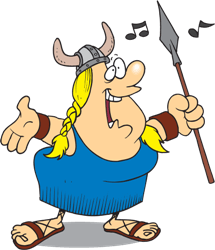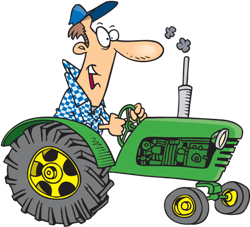Learn English Verbs
Let's learn English verbs. And as usually, let's start from the beginning.
Click Here for Step-by-Step Rules, Stories and Exercises to Practice All English Tenses
What is a verb?
A verb is a word, or a group of words, which describe an action or a state.For example:
sing

drive

write


Now, sing, drive and write are all verb because they are actions. But a verb can also be a state.
For example:
love


know

have


Love, know and have are not actions, they are states. And they are verbs too.
A verb can be a word, or a group of words.
For example, in the sentence "I will win this time!", the verb is made of 2 words.
The word "verb" originally comes from the Latin word verbum, which means "word".

Another important subject that will help you learn English verbs is the subject of person.
Now, what do we mean by that?
Each action (or state) has someone connected with it. In other words: Who? Who is doing it? Or, who is in that state?
We call it the "person."
When the verb shows an action or a state of the person speaking, we say the verb is in the first person.
In the following sentences the verbs are in the first person:
I go to school.
I like pasta.
We drink water.
When the verb shows an action or a state of the person you are speaking to, we say the verb is in the second person.
In the following sentences the verbs are in the second person:
You look pretty.
You sleep too much.
You play golf.
When the verb shows an action or a state of someone else, which is not present, we say the verb is in the third person.
In the following sentences the verbs are in the third person:
He is a good guy.
She has a garden.
It works fine.
They sing together.
Of course, just because we call it a "person" it does mean it has to be a real person! The action can be connected to an object, an animal, etc.
For example: The phone rings.
"Rings" is a verb in the third person.

In addition to person, each verb also has a certain time. In other words, when does it happen? Past, present or future? Is it complete or in progress? We call this the tense of the verb.
For the complete, step by step, guide of English Tenses visit this section.
In short, English has 12 different tenses, which show when the action or state take place.
In the following sentences the verbs are in the PAST tense:
In 1999 I lived in Toronto.
Yesterday we met on the beach.
He left an hour ago.
In the following sentences the verbs are in the PRESENT tense:
They visit us often.
I feel great.
You have a car.
In the following sentences the verbs are in the FUTURE tense:
The cat will catch the mouse.
Father will be here soon.
We will come to the party.
Sometimes just saying when the action or state take place is not enough. We might also want to mention whether the action is complete, or in progress. This is called the aspect.
In other words, a verb can indicate any of the following:
1) When the action takes place, with no additional information.
2) When the action takes place, and that it is in progress.
3) When the action takes place, and that it is complete.
4) When the action takes place, that it was in progress and that it is finally complete.

Now, don't faint just yet! Some examples follow...
1) When + no additional data (simple tenses):
Kate walked home.
(only shows when: in the past, no extra data)
Kate walks home every day.
(only shows when: in the present, no extra data)
Kate will walk home tonight.
(only shows when: in the future, no extra data)
2) When + in progress (progressive tenses):
Yesterday at 5 o'clock Kate was walking home.
(shows when: in the past, and also indicates the action was in progress)
Kate is walking home right now.
(shows when: in the present, and also indicates the action is in progress)
Tonight at 9 o'clock Kate will be walking home.
(shows when: in the future, and also indicates the action will be in progress)
3) When + completion (perfect tenses):
Kate had already walked before 8 o'clock.
(shows when: before something in the past, and also indicates the action was complete)
Kate has walked for a long time.
(shows when: before the present, and also indicates the action is complete)
By midnight, Kate will have walked home.
(shows when: before the future, and also indicates the action will be complete)
4) When + in progress + completion (perfect progressive tenses):
Kate had been walking for 2 hours before she got home.
(shows when: before something in the past, and also indicates the action was in progress and later it was complete)
Kate has been walking for 2 hours.
(shows when: before the present, and also indicates the action was in progress and now it is complete)
By the time Kate gets home, she will have been walking for 2 hours.
(shows when: before the future, and also indicates the action will be in progress and then it will be complete)
Learn English Verbs – Final Words
English verbs are an important part of English. Learn English verbs well, and you are well on your way to mastering the English language.But how can you do that?
In order for you to learn English verbs, you first need to understand the basics of the subject, like the ones we covered in this section.
Then you should practice them until you know them very well.
Continue that way and gradually increase your vocabulary. Learn English verbs that are new to you and practice them in real life sentences!

Your Next Steps
-
If you wish, you can REREAD this Learn English Verbs section
- Study
the complete step by step guide of English Tenses
- Learn
about regular verbs ("worked") and irregular verbs ("ate")
- Learn about stative verbs ("love") and dynamic verbs (action verbs) ("break")
- Learn the differences between gerunds ("walking") and infinitives ("to walk"), and when to use each of them
- Learn the English modal verbs (can, could, may, might, must, ought to, shall, will and would)
- Learn the difference between main verbs ("go"), auxiliary verbs (helping verbs) ("are") and compound verbs ("are going")
- Learn about English linking verbs ("seem")
- Learn the difference between English transitive verbs ("drink") and intransitive verbs ("stand")
- Learn about English phrasal verbs ("run into")
- Get help in teaching helping verbs
Get Updates, Special Offers, and English Resources
Download your FREE GIFT (the first two chapters of
English Short Stories Book and Workbook)
as soon as you join!

By submitting your email, you consent to receiving updates and newsletters from us and to the sharing of your personal data with third parties for the purposes of sending you communications. We will not spam you. You can unsubscribe at any time. For more information, please see our privacy policy.








